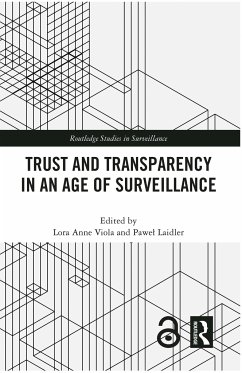Investigating the theoretical and empirical relationships between transparency and trust in the context of surveillance, this volume argues that neither transparency nor trust provides a simple and self-evident path for mitigating the negative political and social consequences of state surveillance practices.
Dominant in both the scholarly literature and public debate is the conviction that transparency can promote better-informed decisions, provide greater oversight, and restore trust damaged by the secrecy of surveillance. The contributions to this volume challenge this conventional wisdom by considering how relations of trust and policies of transparency are modulated by underlying power asymmetries, sociohistorical legacies, economic structures, and institutional constraints. They study trust and transparency as embedded in specific sociopolitical contexts to show how, under certain conditions, transparency can become a tool of social control that erodes trust, while mistrust-rather than trust-can sometimes offer the most promising approach to safeguarding rights and freedom in an age of surveillance.
The first book addressing the interrelationship of trust, transparency, and surveillance practices, this volume will be of interest to scholars and students of surveillance studies as well as appeal to an interdisciplinary audience given the contributions from political science, sociology, philosophy, law, and civil society. The Open Access version of this book, available at www.taylorfrancis.com, has been made available under a Creative Commons Attribution-Non Commercial-No Derivatives 4.0 license.
Dominant in both the scholarly literature and public debate is the conviction that transparency can promote better-informed decisions, provide greater oversight, and restore trust damaged by the secrecy of surveillance. The contributions to this volume challenge this conventional wisdom by considering how relations of trust and policies of transparency are modulated by underlying power asymmetries, sociohistorical legacies, economic structures, and institutional constraints. They study trust and transparency as embedded in specific sociopolitical contexts to show how, under certain conditions, transparency can become a tool of social control that erodes trust, while mistrust-rather than trust-can sometimes offer the most promising approach to safeguarding rights and freedom in an age of surveillance.
The first book addressing the interrelationship of trust, transparency, and surveillance practices, this volume will be of interest to scholars and students of surveillance studies as well as appeal to an interdisciplinary audience given the contributions from political science, sociology, philosophy, law, and civil society. The Open Access version of this book, available at www.taylorfrancis.com, has been made available under a Creative Commons Attribution-Non Commercial-No Derivatives 4.0 license.








